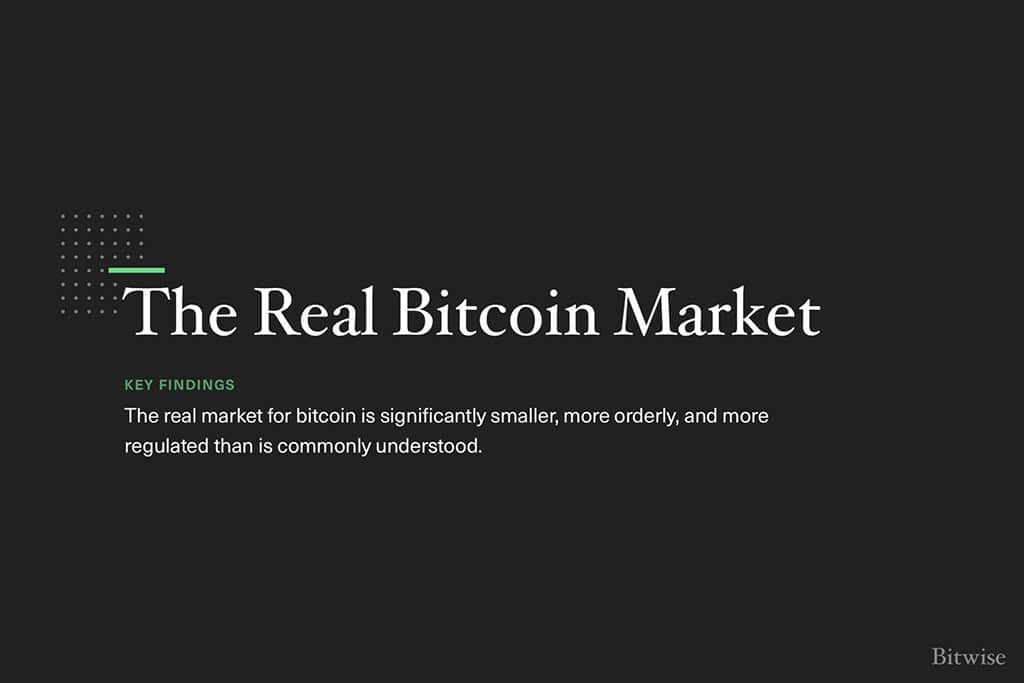While many use CoinMarketCap as a go-to resource for cryptocurrency market data, roughly 95% of Bitcoin trading volume reported by this website is fake, according to Bitwise Asset Management report.
CoinMarketCap reports approximately $6 billion per day in Bitcoin trading volume, but the actual figure is $273 million, or roughly 4.5% of the reported amount, according to Bitwise.
Bitwise reported its data and claims to the United States Securities and Exchange Commission (SEC) as part of a proposed rule change for its application to launch a Bitcoin (BTC) Exchange Traded Fund (ETF).
The analysis opens with the argument that while an ostensible. It says $6 billion in daily traded volume for Bitcoin is reported across the spot markets.
They said:
“Under the hood the exchanges that report the highest volumes are unrecognizable. The vast majority of this reported volume is fake and/or non-economic wash trading.”
Bitwise sourced its data from the CoinMarketCap, which it claims includes a large amount of this suspect data.
8/ Second test: real exchanges have volume spikes that align perfectly (literally on the same hour) because they're all part of the same market. pic.twitter.com/qalAsI09am
— Bitwise (@BitwiseInvest) March 22, 2019
From CoinMarketCap they said that Bitwise claims that roughly 95 percent of the reported volume is fake and that the real market for BTC is thus “significantly smaller, more orderly, and more regulated than commonly understood”, amounting in reality to $273 million.
Bitwise analyzed regulated exchanges using Coinbase Pro as a case study in order to reveal the nature of the trading patterns it deems to be trustworthy. Key characteristics reportedly include an “unequal and streaky” mix of red (sell orders) and green (buy orders) trades, whose distribution fluctuates considerably at any given time.
Is the Volume Fake?
Bitwise says that futures aside, the true spot market for Bitcoin essentially exists on 10 different exchanges conducting nearly $300 million in daily trading volume.
Unlike other exchanges, the 10 on its list, which include Coinbase, Bitfinex, Gemini and Binance (among others) trade uniformly with one another, meaning the average spread in price between different platforms is less than 1 percent.
In their presentation, Bitwise said:
“Arbitrage between these ten exchanges is virtually perfect, as demonstrated, with no sustained deviations between prices.”
Matt Hougan, Bitwise’s head of research, said that his company “built infrastructure to programmatically read data from the top 81 reported exchanges.” He said:
“The company stored order book data from these exchanges, looking at recent trades “four times a second over multiple days, with this data then being used to run a series of statistical tests to identify fake behavior.”
He also added that:
“The pattern you see fits natural human behavior: People are more likely to trade small amounts of Bitcoin than large amounts of Bitcoin, and more likely to trade whole Bitcoin than fractions of Bitcoin (i.e., they are more likely to trade 2.0 Bitcoin than 1.9 Bitcoin or 2.1 Bitcoin).”
U.S. regulators have taken a cautious approach to making Bitcoin mainstream for traders. The SEC highlighted the risk of manipulation as reason for rejecting applications for other cryptocurrency ETFs.
Hougan said this also explains why trading volume for regulated Bitcoin futures has seemed weak. Chicago-based CME and Cboe began listing Bitcoin derivatives at the end of 2017 but have had much lower volumes than the $6 billion reported by unregulated exchanges.
“When you realize the size of the real Bitcoin market, the CME starts to look a lot more significant,” he noted.
The office of New York Attorney General also flagged the issue in a recent report warning that exchanges are vulnerable. Because most cryptocurrency trading platforms don’t use the same monitoring tools as stock exchanges, SEC Chairman Jay Clayton has warned that investors may not get a fair assessment of Bitcoin’s price.
Few months ago Jay Clayton also noted that what investors expect is that trading in the commodity underlies that ETF makes sense and is free from the risk of manipulation.
“It’s an issue that needs to be addressed before I would be comfortable.”
